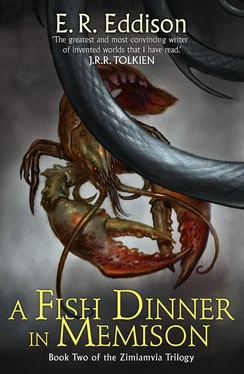‘Vous parlez français, madame?’
‘O, depende dello soggetto: depende con cui si parla. To an Englishman, English.’
‘Mixed with Italian?’
‘Addressed to a person so mixed. Or do I not guess aright?’
Lessingham smiled and replied: ‘You pay me a doubtful compliment, signora. Is it not a saying: “Inglese Italianato e Diavolo incarnato”? And as for the subject,’ he said, ‘if the signora will permit a question: is there then a special fitness to be amused, in French?’
‘Simply to be amused – perhaps, No. But to be amused at this – Yes.’
‘And this is?—’
Her hand, crimson-gloved, on which till now her cheek had been resting, traced, palm-upwards, a little half circle of disdain indicative of the totality of things. ‘There is a something logical: a something of precision, about the French, which very well fits this affair. To be polite to it, you must speak of it in French: it is the only language.’
‘There is in Latin, equally, a precision.’
‘O but certainly: and in a steam roller: but not altogether spirituel . Il faut de l’esprit pour savourer nettement cette affaire-là’; and again her hand delicately acknowledged it: ‘this clockwork world, this mockshow, operated by Time and the endless chain of cause and effect. Time, if you consider it,’ she said, ‘works with so ingenious a simplicity: so perfect a machine. Like a clock. Say you are God: you need but wind it up, and it proceeds with its business: no trouble at all.’
‘Until,’ said Lessingham, ‘you have to wind it up again?’
The lady shrugged her shoulders.
‘Signora,’ he said, ‘do you remember M. d’Anquetil, at that enjoyable unrestrained supper-party in La Rôtisserie de la Reine Pédauque ? “Je vous confierai que je ne crois pas en Dieu.”’
‘And permit me, sir,’ said she, ‘to continue the quotation from that entertaining book: “Pour le coup, dit l’abbé, je vous blâme, monsieur.” And yet I am glad; for indeed it is a regrettable defect of character in a young man, to believe in God. But suppose, sir, that you in fact were – shall I say? – endowed with that authority: would you wind it up again?’
He paused before answering, held by the look of her: the passivity of her lips, that was like the swept silences of the sky expectant of dawn, or like the sea’s innumerable rippled stillness expectant of the dark after sunset: an assuredness, as native to some power that should so far transcend omnipotence as that it needs no more but merely to be and continue in that passivity, and omnipotence in action must serve it.
Like the oblique wide circle of a swift’s flight, down and round and up again, between earth and sky, the winged moment swung: now twenty years backwards into earliest childhood: the tennis lawn, of a June evening, of the old peelhouse where he was born, youngest of seven, of a great border family, between the Solway and the Cumberland hills: church bells, long shadows, Rose of Sharon with its sticky scent: Eton: then, at eighteen (getting on for eight years ago now), Heidelberg, and that unlucky episode that cut his studies short there. Then the Paris years, the Sorbonne, the obsessed concentration of his work in Montmartre studios, ending with the duel with knives with that unsavoury musician to whose Spanish mistress Lessingham, with the inexperienced ardour and quixotism of youth, had injudiciously offered his protection. And so, narrowly escaping imprisonment, to Provence and his Estremaduran Amaryllis: in a few weeks their parting by mutual consent, and his decision (having overspent his allowance, and in case his late adversary, again in hospital, should die, and that be laid at his door) to enlist in the Légion Etrangère under an assumed name. His desertion after some months (disillusioned with such a school but pleased with the experience for the power it gave him), and escape through Morocco in Egypt. Arrival penniless at the British Agency: news that his father, enraged at these proceedings, had stopped allowances and cut him out of his will. So, work his passage home as a stoker on a P. & O.: upon his twenty-first birthday, the twenty-fourth of November, 1903, land at Tilbury, and (by his mother’s means, that queen of women, seconding friendship and strong argument of flesh and blood) at one again with his father before Christmas; and so a year in England, his own master and with enough money to be trusted to do what money is meant for: look after itself, and leave its owner free. Then east, mainly India: two seasons exploring and climbing, Eastern Himalaya, Karakoram. Journey home, against official advice and without official countenance, dangerously through Afghanistan and Persia: then nearly the whole year 1906 in Greece, on horseback, sailing among the islands, studying in Athens. Then – the nineteenth of December, 1906. Sixteen months ago.
The nineteenth of December: Betelgeuze on the meridian at midnight, his particular star. The beginning: dinner at his sister Anne’s, and on with her party to that historic ball at the Spanish Embassy. Queer composition, to let the theme enter pianissimo , on muted strings, as it were; inaudible under such a blaring of trumpets. Curious to think of: towards the end of the evening, puzzling over his own scribble on his programme, ‘Dijon-Fiammetta’, against the next waltz, and recalling at last what it stood for: ‘Fiammetta’ – flame : red-gold hair, the tea-rose she wore in it, and a creamy dress like the rose’s petals. Their dancing: then, afterwards, sitting out on the stairs: then (as in mutual unspoken agreement to leave deserted partners to their devices in the glitter and heat of the ballroom, and themselves to savour a little longer this quiet), their sitting on, and so through two dances following. Whether Mary was tired, or whether minded to leave the ball of conversation to him, they had talked little. Dark girls were the trumpets in that symphony; and he had throughout the evening neither lacked nor neglected opportunity to store his mind with images of allures, Circean splendours, unstudied witty charms, manifested in several partners of that preferred complexion. The mockery! that on such hushed strings, and thus unremarked, should have been the entry of so imperial a theme. So much so, that the next morning, in idle waking recollection casting up the memories of the night before, he had forgotten her.
And yet, a week later, Christmassing with Anne and Charles at Taverford Manor, he had forgot the others but begun to remember her: first, her talking of Wuthering Heights , a very special book of his: then a saying of her own here and there: the very phrase and manner. She had been of few words that night, but those few singularly as if her own yet not self-regarding: pure Maryisms: daffodils or stars of the blackthorn looking on green earth or out to the sun. As for instance this (comparing Highlanders and the Tyrolese): ‘Mountain people seem all rather the same – vague and butterflyish. If they lose something – well, there it is. All ups and downs. I should think.’ Or this (of the smallness of human beings in an Alpine valley): ‘What weasels we look!’ Also, there had been near the corner of her mouth, a ‘somewhat’, that sometimes slept, sometimes stirred. He had wondered idly who she was, and whether these things took place as well by daylight. And then, next week, at the meet of the West Norfolk, his fresh introduction to her, and satisfying himself on both questions; and, as for the second, that they did.
Then, six months afterwards. Twenty-fourth of June. That river-party: that well planned, well timed, confident proposal: its rejection (a discomfiture in which he had not been singular; rather ninth or tenth; if talk were to be trusted). And, most devastating, something in the manner of her refusal: an Artemisian quality, quiver of startled hind, which stripped scales from his eyes to let him see her as never before: as the sole thing, suddenly, which as condition absolute of continuing he must have, let the world else go hang; and, in the same thunderclap, the one sole thing denied him. And so, that feverish fortnight, ending (thank heaven) with the best terms he might make (her cousin Jim Scarnside playing honest broker): burial of that black No, upon condition he should himself leave the country and not before fifteen months come back for his answer: eighteen months, as first propounded; which he would have shortened to August year (that is harvest time); but Mary would not give ground beyond Michaelmas: ‘An omen too, if you were wise – Vintage.’
Читать дальше












